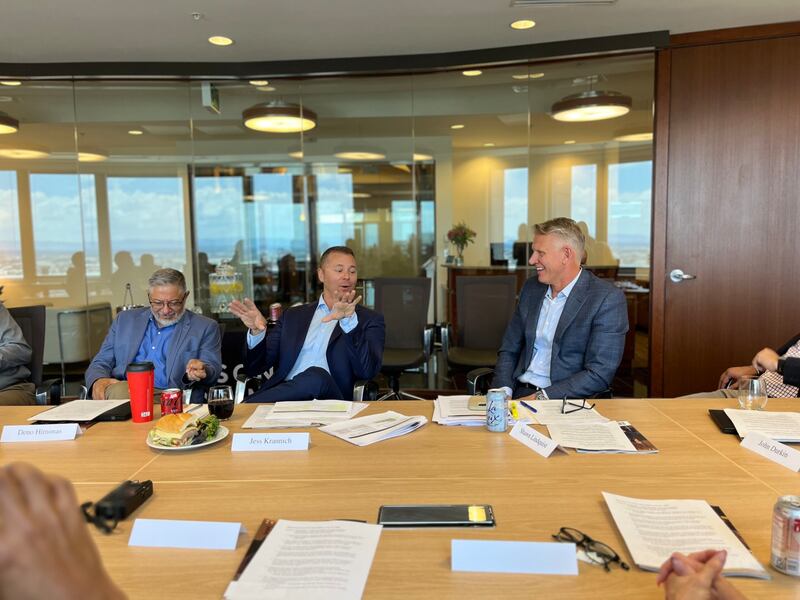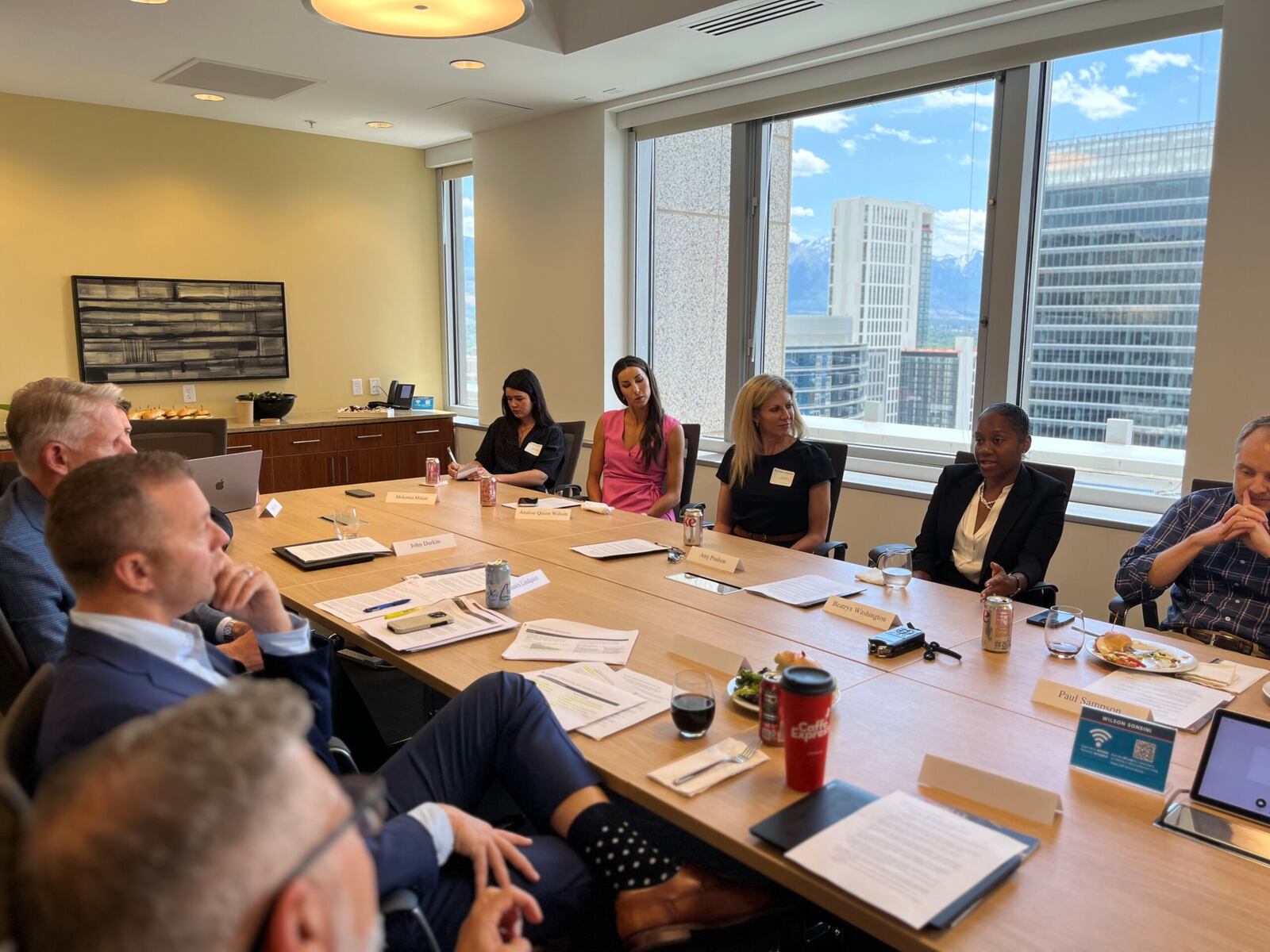Last month, Utah Business partnered with Wilson Sonsini Goodrich & Rosati to host a roundtable discussion on restrictive covenants. Moderated by Jess Krannich, partner at Wilson Sonsini, they discussed common types of restrictive covenants, the impacts of the Federal Trade Commission (FTC)’s proposed noncompete ban and more.
Does your company regularly use restrictive covenants, and in what context?
Beatryx Washington | EVP, General Counsel & Corporate Secretary | O.C. Tanner
O.C. Tanner is an employee recognition company. We represent Fortune 500 companies located all over the world and provide them with everything from SaaS-provided employee recognition platforms to employee awards. We’ll be 100 years old in three years; there are a lot of things that we are trying to protect. Employment is one area where we use restrictive covenants, but O.C. Tanner also has patents and a number of processes we would not want a competitor to use.
One of the most important agreements we have is the confidentiality agreement. We have people all over the globe, and the last thing we want is to have someone who understands our sales strategy and plans go to a competitor. We start the covenants for the sales force and for senior leaders, and that’s probably the area we have to enforce the most.
Analise Quinn Wilson | General Counsel | Ivory Homes
We have a confidentiality provision in our employee handbook, and we expect employees to abide by that. We’re fairly siloed as a company — we have our acquisition team, our development team, the boots-on-the-ground construction guys, a purchasing team, design, architecture — so it isn’t something that keeps me up at night that trade secrets are going to walk out the door. We do use them selectively for two buckets of employees: our executive team and high-level managers. Once someone gets to a point in a company where they’re participating in policy decisions, looking at the market or making strategic decisions, those types of people are currently subject to both nonsolicit and noncompetes.
Our biggest concern as a company is our relationships with land sellers. Land is a finite resource that’s quickly being used up, and so the relationships we’ve built over years working with farmers and different families are very valuable to us. The people who interface with them are our highest priority in terms of making sure they don’t try to take those relationships to a competitor. We have that acquisition team, who has all of those relationships, sign noncompetes and nonsolicits.
John Durkin | Associate General Counsel | Recursion
We’re a techbio company and are a little different than your traditional biotech companies. We’ve been an AI-driven company for 10 years. We’re really concerned with traditional R&D [research and development] protections from an IP [intellectual property] perspective.
What’s interesting about restrictive covenants in our world is how data and AI grow. We’re pulling data from articles in medical journals, … and we’re patenting our AI models as well. We’re certainly focused on our methods and how we’re protecting that IP. Data privacy is going to evolve into your restrictive covenants and where you’re getting your information from. It’s no longer just individuals that you have to worry about — or people being poached; if we digitize a molecule or we digitize chemistry, it’s suddenly a lot harder to track where that goes and where that flows out.
Dan Munro | Associate General Counsel | Purple
All of our employment agreements company-wide — regardless of position or level within the organization — have some or all of the standards, from nondisclosure to nonsolicitation and noncompete. When you get to a senior level or join our R&D team, there are some additional protections with assignments of IP with additional training around the practical implications of what those covenants mean.
Something that probably any direct-to-consumer company has to deal with is influencer agreements and trying to negotiate some form of exclusivity, whether it’s time-limited or otherwise. Carving out what the actual definition of a competitor is going to be is something that we see a lot of back-and-forth on. We try and always have exclusivity, and we try to retain all the rights to the content where it makes sense. That’s something top of mind as we’re trying to be real particular about the influencers [we work with]; the brand ambassadors we’re targeting are probably targets of our competitors as well.
Joshua Foukas | Chief Legal Officer & General Counsel | USANA Health Sciences
When we talk about restrictive covenants for USANA, there are two different areas: executives and employees on the one hand, and then an independent contractor sales force in 25 markets around the world. With respect to those covenants, noncompetes in particular, we’ve been very deliberate and used those sparingly in the employee category. We have not used them at all in the independent contractor category. We’ve just relied on nonsolicitation agreements for the most part, depending on the country. For employees, it depends. If you’re coming into the R&D department, where you have access to our product formulations and other sensitive information, we’re more particularized in our documentation for those employees.
The ban on non-competes from the FTC is entirely consistent, in our view, with their posturing and where they’d like to go in our country. With respect to direct selling and our business model, noncompetes and the FTC have really been an afterthought for us. When we deal with the FTC, it’s really along the lines of consumer protection, not unfair competition. But we’re not at all surprised at their posturing on this and where they’re going with it.
Courtland Astill | General Counsel | Traeger, Inc.
At Traeger Grills, we do wood pellet smokers and outdoor cooking accessories. We also own a wireless meat thermometer company in the U.K. called MEATER. As a general counsel, whenever there’s a breach of a restricted covenant, HR comes running and people come crying. It’s a big deal, and I think it’s important to stay sharp on these types of topics because people want answers right away, and there’s always a panic when it happens.
We really use restrictive covenants to protect our investments. We have a lot of influencers on social media, and we have a noncompete clause we negotiate with each of them. We don’t want them using competitive products if they’re representing Traeger, and we’re investing money, time and energy into them and helping them build their brand.
Olivia Shaughnessy | Corporate Counsel | bioMérieux
Outside of R&D or the employment side, in the commercial context, I see these things come up most often in the exclusivity provisions we have in contracts with our customers. We offer really aggressive pricing, so one thing we say is, “You have to use us exclusively for this product category.” Enforcement is a whole other can of worms from a logistical standpoint and also the confidentiality standpoint between them and their other vendors. It’s a tricky area enforcement-wise, but that’s one thing we use as leverage to get customers to comply with their obligations when we’re extending really aggressive pricing.
Shawn Lindquist | Chief Legal Officer & Secretary | MX Technologies
We can argue about whether what [the FTC is] doing is constitutional or overreach or even statutory. They have the statutory authority, but I don’t think they’re listening to both small and big businesses and the fact that we’re investing a lot in people. The two most valuable assets of a company are its people and its trade secrets, right? So how do we protect those? I’ve been around almost 30 years now, and I’ve seen all kinds of things. There are good people and there are bad people — and there are bad companies, too — who will steal your people to get your know-how.
This [FTC ban] is unprecedented. We’re throwing out 100 years of noncompete law, probably more than that. We’re throwing out all of the case law, all of the reasoned judicial interpretations of the law — as well as what states have done — in one fell swoop, in a very broadly drafted rule that could impact M&A and other situations where there are sophisticated parties negotiating.
Amy Poulson | Senior Corporate Counsel | Savage
A large percentage of our team is in blue-collar positions, and there is just not an effective way to have noncompetes with them. Our way of preventing them from going to other places is by providing culture, wages and benefits that are attractive to them and better than our competitors. We have offices here in Salt Lake City, Kansas City and Texas, and we operate in most of the states in the U.S. as well as Canada, Mexico and Saudi Arabia. We’re dealing with different laws and all of those environments, but mostly in the employment space.
At this point in my career, I could look at an NDA or a confidentiality agreement in my sleep because there have been so many of those as parts of deals and transactions. We have a very robust M&A practice, and we are constantly adding and sometimes selling off businesses. Of course, that is a huge concern for us in relation to the FTC rule because you want to protect the value of the business you’re buying.

The FTC has proposed a very broad ban that impacts a number of different scenarios. Let’s assume it gets enjoined and the law continues to be state-by-state. How concerned are all of you that Utah may get more aggressive in this area?
Garner Meads | Former Chief Legal Officer
Depending on whether the FTC’s proposed final rule is deemed enforceable or not, this question may be more academic with respect to noncompetes, as that rule is about as hostile as it comes. At a much higher level, I hope Utah lawmakers take a measured approach in this arena. I think the data supports that some of the economic growth we have seen in the form of companies setting up shop in Utah is directly tied to Utah having a business-friendly environment. To the extent that any of this is left in the state’s hands, I hope they will take that into consideration.
Shawn Lindquist | Chief Legal Officer & Secretary | MX Technologies
I think the best way to handle a company that’s got people everywhere is to come up with a standard form that has a state-by-state, jurisdiction-by-jurisdiction appendix you update every year. Otherwise, your life — or the life of whomever on your team is responsible for those agreements — is going to be miserable.
Companies have to make a policy decision. Are we going to treat people in California differently than people in Utah, than people in the U.K., than people in Asia? Companies need to take a balanced view of the right people who should be subject to the right provisions. … You shouldn’t have the receptionist sign a noncompete or a nonsolicit unless they’re the executive assistant to the CEO. … Some of the trending policies in other states make me nervous, especially California’s.
Garden leave policies have gotten both very creative and very fair in terms of how they’ve navigated the morass of state law on noncompetition issues over the last several years. This law would take all of those things away. Does that give you concerns?
Beatryx Washington | EVP, General Counsel & Corporate Secretary | O.C. Tanner
We’re B2B. Let’s say you have a large public company as a client and we decide that we want to hire one of your employees. This employee makes less than $100,000 dollars and worked specifically with your largest client. We’ll know your pricing, your strategy, your employee org chart — who the decision-makers are and how long they’ve been there. The amount of intel that that person would have — who is not considered to be a “decision-maker” — is ridiculous.
Deno Himonas | Partner & Attorney | Wilson Sonsini Goodrich & Rosati
I’ve been practicing since the 1980s, and I see this as a pendulum in many ways. I don’t know if some of you will remember the days when everybody signed a noncompete. The FTC rule is the other end of the pendulum. The long-term perspective for me is, whether it passes or doesn’t pass, this isn’t where we’ll end up a couple of years from now.
The dangerous question is: If it’s fair game for everybody, is it fair for you to start thinking about who you might be able to hire? Rather than being defensive, being offensive and thinking proactively about that. At that point, when the gloves are off, you’re going to lose a competitive advantage if you’re playing by a different set of rules than everybody else.
Dan Munro | Associate General Counsel | Purple
If you’re creative enough, maybe you can find a way that actually works. One of the negative impacts would be, if all we have left without a noncompete is the enforcement mechanisms for NDAs — and let’s say you do properly segment your data — that can start to create a culture of a lack of trust and transparency. When you have really high-value innovation that’s changing the world economy on a daily basis, putting the brakes on that is not just detrimental to an individual company. It’s detrimental to the United States economy as a whole.
Shawn Lindquist | Chief Legal Officer & Secretary | MX Technologies
It would be great to have a reasonable federal standard that balances the needs of the individual and the needs of the company. I don’t think you should be able to restrict the mobility of employees. If we can’t keep them with other things — an incredible job and benefits and reasonable pay — then that’s not fair.
My concluding remark would be, as general counsel especially, [let’s give] good advice and push for more reasonableness on both sides. … We need to be more active in making sure that legislators and regulators really understand the unintended consequences and implications of the decisions they’re making.



